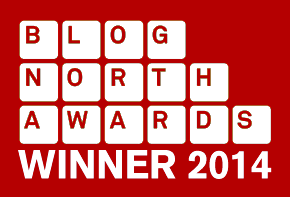“For three years I would have the same conversation with Nathan, ‘What are you going to do when you leave school?’ I’d ask him. ‘I want to be a gangster,’ he’d say, ‘that’s what I want to do.’”
Andrea is the founder of Heartlift, a small charity working on the Breightmet estate with small groups of, mainly, young men.
“He thought if he was a gangster he’d get loads of girls, a nice car and lots of money,” she says. “‘But you’ll also get 10 years in prison,’ I’d tell him. It was a risk he was prepared to take. Being a gangster was his ambition until he was 16.”
Nine years ago Andrea’s day job was as a defence solicitor where she saw plenty of young people stuck in the hamster wheel that is the criminal justice system.
“16- and 17-year-olds were getting sentences which would just be the beginning of a lifetime in and out of prison,” she recalls. “By the time they were in court, it was too late, there’s little you can do. I wanted to try and address the problems and work in prevention instead. So I set up Heartlift.”
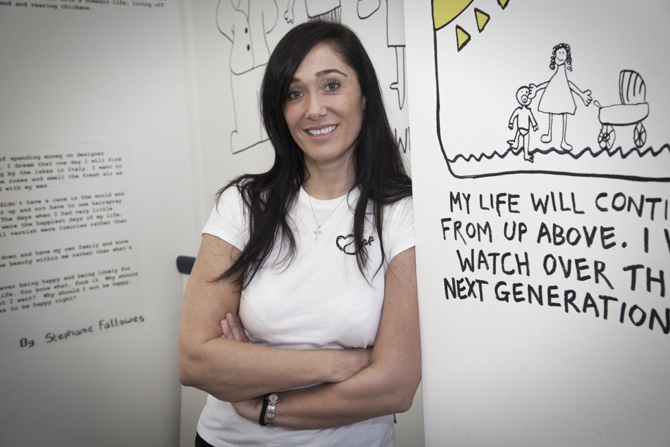
We are in Andrea’s ‘bedroom office’ in a converted house a few streets away from the UCAN. It’s a Bolton at Home community hub, its white walls sprinkled with quotes and illustrations as part of an innovative arts project.
“How,” I ask, “do you describe Heartlift to others?”
Andrea doesn’t hesitate. “We love people back to life,” she says.
As if on cue, a couple of smart-looking teenage boys come bounding up the stairs and are greeted in our open doorway with a hug from Andrea. “Nice haircuts,” she says, and then to me, “I organised a couple of hairdressers last night and we had 21 kids here, all getting their hair cut.” The boys disappear, they have things to do.
“That’s the difference between us and other agencies. We care and love the people we work with and they know it.
“I know that is a risky thing to say but I think it’s what’s missing. We’ve lost the basic right to feel compassion and empathy, to be a human beings, haven’t we?
“Nowadays those working with young people are frightened of showing any sort of emotional empathy. They’ve become robots, and kids don’t understand that.”
“You think some professionals don’t get close enough?” I ask.
“As a worker in this field you have to protect yourself, I know that. But it’s gone too far the other way. You have to get close, you have to roll your sleeves up, it’s just not workable otherwise.
“From the family’s point of view, if they see someone who is not willing to support them all the way – and it does get messy – then they just feel they are being judged.”
“There’s no mention of it on your website,” I say, “but you’re a Christian charity, aren’t you?
“If you have to say you are a Christian charity then you’re doing something wrong. You should be showing it through your words and actions. I don’t believe in preaching to people. I don’t think it’s helpful.”
“Do the young people go to church?” I ask.
“I’ve never asked any of the kids to come to church, but often they are curious and ask if they can come along. That’s fine with me. We are faith-based, not faith-biased. It’s live and let live, isn’t it?”
continued in Living the Dream
…continued from A family not an agency
“So, what happened to Nathan?” I ask.
“He came to one of our wrestling sessions… and got beaten by a girl! He couldn’t believe it! He’d had an horrific upbringing and had never seen women as being strong in any way. It blew his mind.
“So then he started coming every week… he trained and trained. He got good at it and started winning competitions nationally and then internationally.
“And he changed?”
“It took a long time,” says Andrea. “There were plenty of phone calls at two in the morning when something had gone wrong, it needed lots of patience.”
“Which is the difference, isn’t it? Between yourselves and a statutory agency?”
“I’m sure there are other good agencies out there but, in truth, I don’t know who else would have done that.”
“And, if you hadn’t done it, then Nathan would have been a gangster?”
“Yes, there’s no doubt about it. He would definitely had been in prison at a very young age. I’m not speaking ill of him: he would tell you the same.”
“That must give you a huge amount of satisfaction?”
“If I never did anything else, it was worth doing for Nathan.”
“Where is he now?” I ask.
“Living in Guam, four hours past Japan. He’s 26 now, married to a two-time Olympic wrestler. They have a beautiful baby – my goddaughter – and he’s a manager at Calvin Klein. He literally is living the dream.
“And even though he is halfway around the world, all our young people look up to him and see him as a role model. Whenever he’s back in the UK, he always comes here first.”
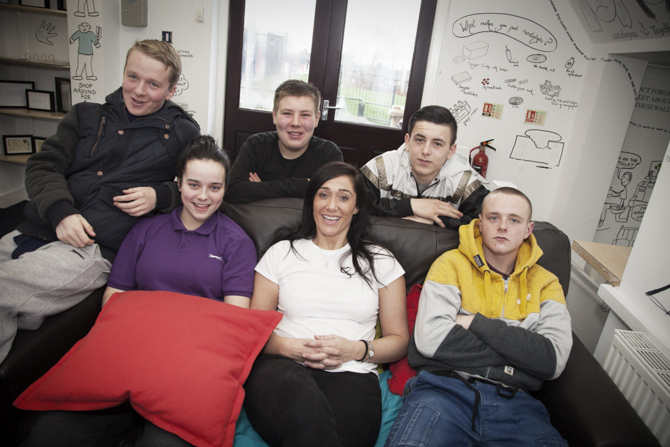
Jason, another on Andrea’s programme, is next up the stairs. We’ve already met. He and Andrea came to the UCAN the other week. I’m going to interview him for this blog soon.
She shows me his timetable. “Everything is tailor-made to that particular young person, that family, that child,” she says. “And there is never a timescale to our work… we’ll always be here for them.”
Jason’s week includes helping in the Heartlift office, group sports sessions, volunteering on community projects in Breightmet and even supporting Andrea and the team with a teatime session with primary school kids. It’s a lot about self-esteem and introducing a routine.
“These lads don’t think they can manage a full five-day week,” says Andrea. “So we’ve put this schedule together to show them they can.”
“And how do you dovetail with the UCAN?” I ask as Jason sets off downstairs.
“It’s a perfect partnership really. The UCAN offers all the things we don’t. We’re the emotional support and, the way I see it, these lads wouldn’t have the confidence to walk in the UCAN without us. So we make the introductions and once they feel comfortable they’ll go in on their own.”
“Looking at individual needs; seeing the whole person with compassion; non-judgmental empathy. I can see the similarities between the UCAN and Heartlift,” I say.
“Yes, and it means a lot to me to know that Vanessa understands and appreciates what we do.”
Before I wrap up our chat and, with an eye on my upcoming interview, I ask about Jason.
“When all the boys started the programme, they’d tend to show their emotions. If they were angry, you’d know about it. Jason wasn’t like that. Everyone thought he was a lovely kid. And he is. But, because I’ve been doing this for a long time, he concerned me most.
“We ended up unravelling a whole history of sadness. We took the time to keep asking if he was okay. And we kept showing him we cared. He knew he wouldn’t be judged and, whatever it was, we’d be there to support him.
“Eventually we started unpicking what had happened and he started to write things down in his diary. We uncovered all the stuff he had carried around all his life and, in particular, over the last four years… the stuff that had manifested itself in really destructive ways.
“Now that’s stopped and he’s getting it out of his system in words.”
His appointment is at 9am at the Royal Blackburn Hospital, two buses and a train away or half and hour in the car.
Richard can’t manage public transport on his own. He gets panicky. He’d asked his social worker and his alcohol team worker. Both were unavailable to take him which is where I stepped in. He gets a much-needed lift, I get another story for this blog.
So now, having met in a Morrison’s car park, we’re driving through the East Lancashire countryside in the rain, discussing his ADHD (Attention Deficit Hyperactivity Disorder).
“How does it affect you on a daily basis?” I ask.
“My concentration levels are really, really low,” he says. “I’m always thinking of 100 things at once and I can’t stop it. It’s very frustrating. I can’t organise myself.”
“So what are you thinking about now, as we’re talking?”
“I’m thinking about this wonderful scenery, about the detox and about the questions they are likely to ask me this morning.”
Because of his ADHD, his alcohol dependency and his depression and anxiety, Richard currently receives Employment Support Allowance, a benefit which means he’s unfit for work. However, he does volunteer at the UCAN on a Monday afternoon, helping IT freelancer, Charlotte get people online.
As part of the welfare reforms, he has a controversial ATOS interview this morning to assess whether he should be put on a different benefit.
In 300 yards turn left.
“I’ll give you another example,” he says. “I can completely zone out. I might start crossing a road and not realise it. It’s a miracle I haven’t been knocked over by now.”
Richard is 34 and he tells me he’s been drinking and using drugs since he was 14. “The last 10 years have been full-on addiction but I’ve only admitted it these past five years.”
He’s waiting to be admitted on a three-week hospital detox, although it’s not the first time he’s tried to stop.
“I’ve come off in the past, just to prove a point, but that’s not the same, is it? This one is for me. Because I want to change.”
As well as the detox, his psychiatrist has changed his ADHD medication and booked him on Cognitive Behavioural Therapy sessions – talking therapy – for the next couple of years.
“You’ve got quite a journey ahead of you, haven’t you?”
After 300 yards turn right and then bear right.
“I’m scared though. Because alcohol is all I know. It’s going to be hard.”
Richard’s two-hour volunteering session at the UCAN is a lifeline at the moment, the highlight of his week. “I went to do an IT course there and was shocked when Charlotte asked me to volunteer. I can manage it for a couple of hours and, because it’s something I’m passionate about, I can focus on it for that short time. Now I’m buzzing.”
In 300 yards, you have reached your destination.
Continued in “Do you think you can work?”
…continued from Fit for work?
At the hospital we eventually find the right place and are promptly ushered into a standard consulting room where a pleasant nurse – she tells us later she used to work on a drug and alcohol team – explains the procedure and starts asking questions.
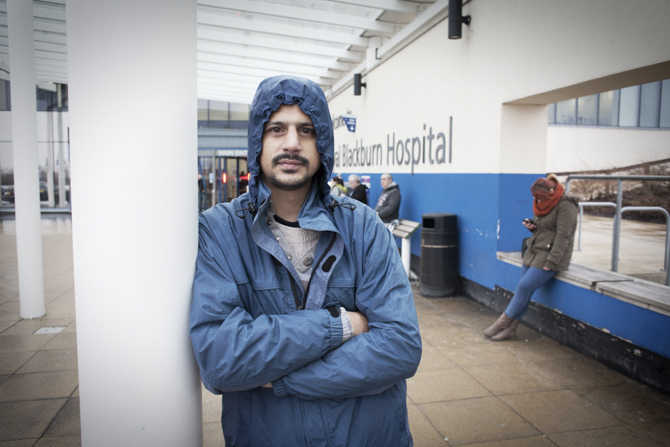
She works through each of Richard’s symptoms: ADHD, alcohol dependency, hearing loss, anxiety and depression, and asthma and asks the same questions for each, typing his responses. “What are the symptoms of your ADHD?”
Richard is nervous. “Lack of concentration, confusion,” I recall he says.
She asks who diagnosed the condition, when, what tests did they do? When was the last time he saw a medical professional about this condition? She asks about his medication and then a series of standard questions about his daily routine. Can he cook for himself? Can he use a microwave? Can he wash himself? How often does he use the toilet at night?
The questions are rigid and formulaic. When she asks if he can use a microwave to heat and cook food Richard replies he can’t cook but he does heat food. “I can’t differentiate,” she says, “I’ll put down, cook and heat.”
The inadequacies of these ATOS assessments are well documented elsewhere but the irony of Richard’s situation isn’t lost on me. His ‘headline’ symptoms are an inability to concentrate and a tendency to get confused and here he is, sitting on the edge of his chair, being expected to articulate expansive answers to these quick fire questions and build his own case for staying on a disability benefit.
Throughout the half hour assessment the nurse makes it clear that she is not the one who will make the final decision. That will be left to a Department of Work and Pensions case manager who will read the report having never met Richard.
“I was expecting to be able to go into more detail about my own personal circumstances,” he says on our way back. “There should have been more on the emotional side, how ADHD affects me.”
“Although I barely know you Richard, I think I found out more about you in our thirty-minute journey there than she did in that formal interview.”
“You’re right. You did. I was much more relaxed.”
“Do you think you can work?” I ask.
“My concentration levels only allow me to do things in small quantities. It would need to be something I enjoy, something I can focus on. Anything boring or mundane, then I just wouldn’t be able to stick with it.”
“And as it stands now, you’re an alcoholic. Do you think you could actually hold a job down? Could you leave the house at eight and come back at six without having a drink?”
“No. No, I couldn’t.”
I walk through a bunch of teenage boys – and a cloud of marijuana smoke – to get to the front door this morning. Judging by the looks I get from those sitting at the nearest computers, some of the smoke follows me inside.
It’s only 9.30 and, as ever, the front room is already busy. Five of the eight computers are in use and I see job applications, emails and some online learning on the screens as I make my way to the back offices.
The UCAN isn’t open to the public every day but on these open access mornings Rosanne and Carl deal with a torrent of enquiries that sees them flitting from customer to customer, trying to keep all the plates spinning.
This morning I’ve decided to shadow Rosanne for as long as I can keep up, to get an idea of her role as a UCAN project officer.
By the time I have my notebook in hand she is already helping a young woman at one of the computers.
“How do I send this now?” asks the young woman. Rosanne points at the screen and reminds her how to send the email, an application for a job. “Brilliant. Thank you.”
Another woman is standing in the middle of the room, waiting her turn. “Do you know what I do with this?” she asks, holding out some papers.
Rosanne scans the form and passes it back, “Next, you need to list everyone who is moving with you. Then please let me see it again before you send it. Do you need an envelope?”
Back in the small office from which Rosanne keeps on eye on comings and goings there is a small huddle of colleagues. Vanessa is leading a discussion about the homeless alcoholic man who is frequently outside their parade of shops. Minutes later the huddle breaks and Rosanne is out into the front room again.
“Hiya, are you all right?” she says to a man who has just side stepped the ‘cannabis crew’.
“Can I use the phone please?” he asks. “Do you have the number for Jobseeker’s?”
As Rosanne’s pointing out the numbers pinned up above the customer phone, another man is signing in, the front door barely having had time to close. This customer wants to use a computer.
“You might be better off with this one,” she says, directing him to one of the computers which is less temperamental. These machines get a lot of use and some are more reliable than others.
It’s not always clear to me which customers are new to the UCAN as Rosanne treats everyone as if she has known them for years. But within minutes – and after she has exchanged pouches with a colleague delivering the internal mail – she is telling this new arrival about the Tuesday job club which suggests he’s not a regular. “And then there’s the Clear Aims course which is brilliant,” she says. “Cath here can tell you more about that, if you’re interested.”
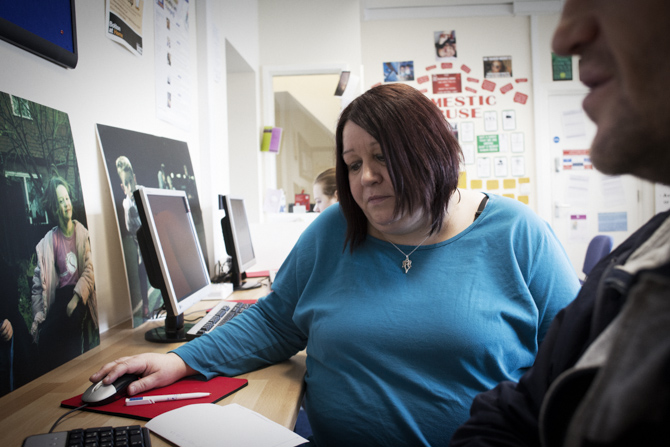
Next Rosanne is answering the telephone. “Half past 12,” she says to the caller. “Then work club from 1.30 til 4.00. Okay, see you then.”
She comes off the phone, beaming. “Why so happy?” I ask.
“That woman on the phone was referred by the Jobcentre. She was told to ask for Rosanne because ‘she’s fantastic’!”
A young mum has just appeared at the office door, gently pushing her daughter in front of her. “She’s starting nursery this afternoon, at the big school,” she declares. “Show Rosanne your uniform, Kelly.”
Kelly proudly peels back her coat to reveal a brand new blue sweatshirt. Rosanne makes a fuss over the little girl and she and her mother leave happy, only to be replaced by a middle-aged woman who looks as if she hasn’t slept in days.
“I’m being made redundant, Rosanne,” says the newcomer, barely able to contain her tears.
“Come and sit down,” says Rosanne, offering the only other chair in the room.
“Can I make you both a brew?” I ask as the office door is closed behind them. I’ve managed about 15 minutes.




